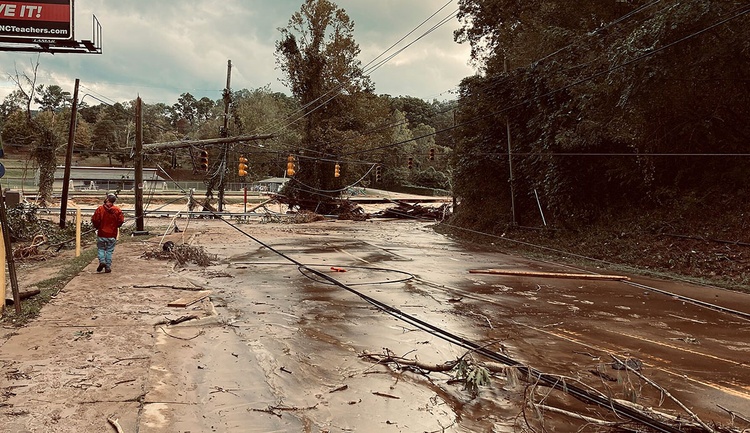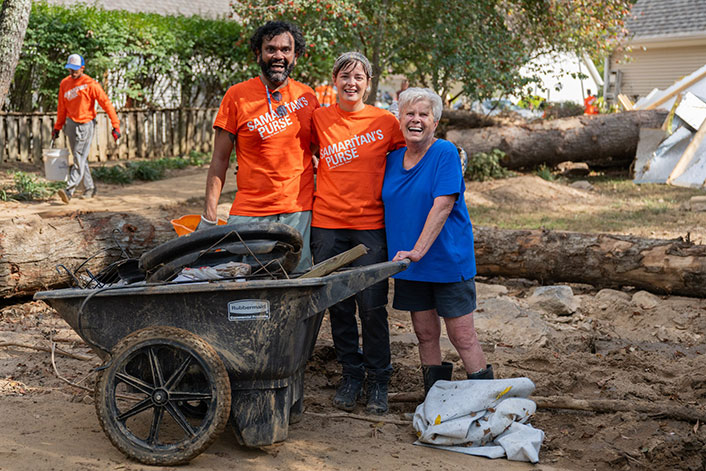Note from Randy: Our hearts go out to the people of western North Carolina and in other communities who’ve suffered so much from the effects of Hurricane Helene. One of the ministries EPM supports and recommends is Samaritan’s Purse, which is based in Boone, North Carolina. It’s amazing that their organization, which is always responding to disasters around the world, is directly impacted by the disaster in this case. Franklin Graham, their president and CEO, has had wonderful opportunities to share with the media about their relief efforts, and also the hope found in Jesus. (See this video to get a glimpse into the devastation and the work Samaritan’s Purse is doing.) Pray for their staff and volunteers. Pray for open hearts in the people they minister to.
I was originally slated to speak at a retreat at the Cove, the Billy Graham Retreat Center in Asheville, North Carolina, later in October. Due to the disaster, they had to cancel all their October events. The staff member I spoke with told me they are making sack lunches daily for the state police whose usual places to eat have been destroyed or closed. It’s so sad, but I did tell the person who called me that we can get a small glimpse of Romans 8:28 by the fact that they are daily feeding the police, and that will not be forgotten when things return to normal. Some of the local skeptics will view them and the gospel differently after all the help they will receive from them.
In the following guest blog, Warren Cole Smith, president of MinistryWatch, shares about the faith-based response to Hurricane Helene. It’s a reminder that there’s a long track record of Christ-followers being the hands and feet of Jesus by serving the suffering, the needy, the poor. (Historically, what religions besides Christianity have established hospitals throughout the world, or networks of famine relief and development to help starving people, victims of disasters and refugees? Who has shown grace, bringing in tons of food, clothing, shelter, man-power, and medical supplies after every disaster? It’s Christians. When Muslims, Buddhists, and Hindus are suffering in far corners of the world, it’s Christians who come to help.)
May God’s people give generously and volunteer to help those in need. And may God use the church’s response to this terrible natural disaster to spread the knowledge of Him and to draw many hearts to Himself.
Helene Unleashed “Faith-Based FEMA”
Gov't has a role, but churches & Christian ministries are “new paradigm” for disaster relief
October 4, 2024
The whole world is now seeing what the people of western North Carolina have lived through this past week. Those sights are generating shock and awe. The strength of the storm and the magnitude of the destruction are stunning. The scale of the devastation is now becoming clear. Western North Carolina will not be back to normal for months, perhaps years. It is also clear that whatever “normal” looked like, the new normal will be different. This storm has recalibrated where and how thousands of people will live from now on.
I live in Charlotte, two hours east of Asheville. We were spared the worst effects of the storm, but even here we see ripple effects. With I-40 and I-26 closed through the mountains of North Carolina and Tennessee, traffic has been diverted for hundreds of miles in all directions. Charlotte-area interstates are now clogged at most hours of the day or night. My own schedule has been altered. I planned to meet with MinistryWatch supporters in Asheville next week, but the restaurant in Biltmore Village where we planned to meet is now full of mud. That trip is now (obviously) not happening.
Tuesday night I sat outside with a friend, and our conversation was interrupted repeatedly by helicopters passing overhead, headed west with supplies. The shelves of the big-box stores here in Charlotte are mostly empty of bottled water and other essential items. These are, of course, minor inconveniences, mere trifles compared to what the people of western North Carolina are facing, but they have provided me with a reality check. It’s clear that Helene’s impact has been rippling out from western North Carolina.
There is also much heartache. This morning the death toll passed 200, most of them in North Carolina, and 72 in Buncombe County alone. That grim number will certainly increase. A childhood friend of my wife Missy has a second home near Saluda, N. C. Three people died on her street alone. I have heard stories from rescue workers who are recovering bodies, some of them ripped apart. The weeks ahead will be hard ones for police, fire, and rescue workers. It’s also important to note that in the rural communities affected, many of these first responders are volunteers. This is certainly not what they signed up for, but I have heard story after story of these men and women rushing in, not running away.
Indeed, the stories abound. A college friend, Paul Hanna, posted on Facebook the story of his son Ben. Let me share it with you:
My son, Ben Hanna and his wife, Mandy, live in Asheville. They have a natural gas generator. So they are the only ones with power in their area. He was able to borrow a StarLink setup from a neighbor with no power and set up an internet hotspot for his neighbors to communicate. They also hosted a street “eat your food before it spoils” party and hosted a movie night for the neighborhood in their front yard and driveway in between the downed trees.
Such grassroots efforts are springing up all round. Ed and Anne Stych are names that might be familiar to MinistryWatch readers. They are part of the team that posts stories to the MinistryWatch website, and Anne has written more than 100 stories for us over the past five years. They are a part of Good Shepherd Anglican Church in Cornelius, N.C., a northern suburb of Charlotte. This small church, working with others in the area, helped send more than 38 small aircraft loaded with supplies to western North Carolina – on Monday alone. Local businessmen Travis McVickers and Kevin Garrison organized these efforts. Garrison set up a GoFundMe page to finance the project. By Friday, he had raised more than $840,000 to pay for supplies, airplane fuel, hangar space, and airplane rentals.
Another member of Good Shepherd Anglican, Matt Creswell, drove up to Banner Elk on Tuesday with a 1,000-gallon tank of diesel. “This has turned into a three-day event,” Creswell texted Ed Stych. “On Wednesday we are cooking 1,000 hotdogs and hamburgers for a little hard-hit community about 45 minutes north of Boone. Sleep is overrated.”
The resourcefulness of some of these grassroots efforts are enough to bring a smile to your face. One example: A mule team hauled supplies to people in Black Mountain, N.C. who are completely cut off by severed roads. The supplies were purchased at Food Lion just outside the area affected, and the local Tractor Supply store donated feed for the mules.
Federal, state, and local governments are involved, of course. They will have to play a major role in what will likely be a years-long recovery effort. But the real story of the first few days after this storm is the scope and scale of these spontaneous, grassroots efforts. They have undoubtedly saved the lives of some and have given hope to many. My friend and long-time journalist Bobby Ross, Jr., said he has seen this phenomenon repeatedly in the disasters he has covered over the years. In fact, he has even coined a term to describe these Christian first responders: “Faith-Based FEMA.” Indeed, as Ross reports, even when the government is involved, it often uses churches as command centers and staging facilities.
These ideas are not new to anyone who has been paying attention. Marvin Olasky is a veteran journalist and a historian of American charity and philanthropic efforts. He wrote after Hurricane Katrina, “Big government didn’t work. And a new paradigm for responding to national crisis has emerged. Private and faith-based organizations have stepped in, and politics will never be the same.”
That new paradigm is now on full display. Ed Stych summarized these grassroots rescue and relief efforts now springing up like a thousand flowers all around North Carolina: “I don’t know if the state and federal governments are doing a good job or a bad job. I just know that we ‘civilians’ need to do what we can immediately to help people in urgent need. We can’t wait for the government to save people.”
This article originally appeared on MinistryWatch and is used with permission of the author.
Header photo: Bill McMannis, CC BY 2.0, via Wikimedia Commons




